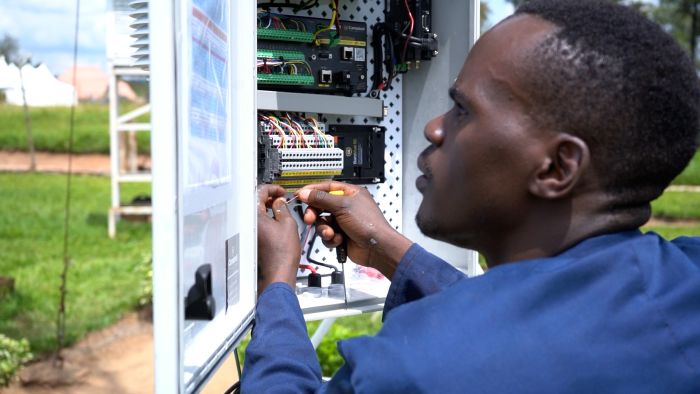





Overview
In a landmark milestone for global meteorological cooperation, Rwanda has become the first country to issue and award a Global Basic Observing Networks (GBON) tender financed through the Systematic Observations Financing Facility (SOFF) initiative.
Campbell Scientific is proud to have played a key role in this first successful implementation, working alongside the Rwanda Meteorology Agency to upgrade three critical surface weather stations with GBON-compliant instrumentation and to deliver expert technical training.
Rwanda occupies a geographically critical location in East Africa, with its diverse microclimates and topography making it a valuable contributor to regional and global meteorological data systems.
Through SOFF support, Rwanda has secured 3.5 million USD in grant funding to upgrade three surface stations and establish the country’s first upper-air (radiosonde) station as part of their ongoing efforts to meet the GBON standards—enabling the country to share high-quality weather and climate data with the global community. This is the first SOFF-funded project globally.
Collaboration for Resilience and Global Integration
This project is part of a wider collaboration supported by SOFF, the United Nations Development Programme (UNDP), the Finnish Meteorological Institute, and the World Meteorological Organization (WMO). It also aligns with the Water at the Heart of Climate Action initiative, supported by the Government of the Netherlands, and implemented across East Africa in partnership with the Red Cross Red Crescent Climate Centre and others.
The improved observational data collected by Rwanda’s upgraded network will directly benefit global numerical weather prediction systems, contributing to early warning services and climate resilience strategies both locally and internationally.
Our Role
In support of Rwanda’s continued advancement in meteorological observation, Campbell Scientific has partnered with the Rwanda Meteorology Agency to upgrade three key surface weather stations. We provided the advanced meteorological instrumentation, data logging systems, and collaborative capacity-building sessions with agency staff to further reinforce local expertise.
The supplied equipment ensures reliable, automated, and accurate environmental monitoring that meets GBON standards:
- Campbell Scientific CR1000Xe Measurement and Control Datalogger with CELL215 Cellular Module
- Reliable data acquisition and remote transmission
- Thies Wind Direction Sensor First Class (4.3151.10.020)
- High-precision sensor for directional wind measurement
- Thies Wind Speed Sensor First Class Advance
- Designed for accuracy in complex meteorological conditions
- Campbell Scientific TempVue™10 Pt100 Analog Temperature Sensor
- Durable and accurate air temperature measurement
- Campbell Scientific EE181 Air Temperature and Relative Humidity Sensor (manufactured by E + E Elektronik)
- Dual-parameter probe for long-term environmental monitoring
- 52202 Electrically Heated Rain and Snow Gauge (manufactured by R. M. Young)
- Trusted for accurate and consistent precipitation measurement
- Campbell Scientific BaroVue™10 Digital Barometer
- Compact, high-resolution atmospheric pressure sensor
Capacity Building and Technical Support
In addition to supplying equipment, Campbell Scientific provided focused, hands-on training tailored to the Rwanda Meteorology Agency’s operational environment. This included:
- Data logger programming and configuration
- Preventive maintenance
- Best practices for data management, quality assurance, and system troubleshooting
- Automated weather station (AWS) installation
These training sessions were designed to complement and enhance the agency’s existing skill sets, promoting long-term sustainability and technical self-sufficiency.
Conclusion
As the first country to successfully issue and award a SOFF-financed GBON tender, Rwanda has set an important precedent for others to follow. Campbell Scientific is honored to work alongside Rwanda in expanding its national meteorological infrastructure reach and reliability. The upgraded GBON-compliant surface stations, backed by expert training and international collaboration, represent a significant step forward in the country’s climate readiness and data‑sharing capabilities. Together, we are building a stronger foundation for informed decision-making, disaster preparedness, and long-term environmental resilience.
For more information, watch our Rwanda’s GBON Upgrade video.
Campbell Scientific was honored to receive the prestigious Varysian Hydrometeorological Award for Best Weather Observation Technology for our work with the team in Rwanda.
案例总结
应用
Improving observational data to benefit global numerical weather prediction systems位置
Rwanda, Africa使用的产品
TempVue 10 CR1000Xe BaroVue 10 EE181 52202参与机构
Meteo Rwanda (Rwanda Meteorology Agency)测量参数
Wind direction and speed, air temperature, humidity, precipitation, barometric pressure查看PDF